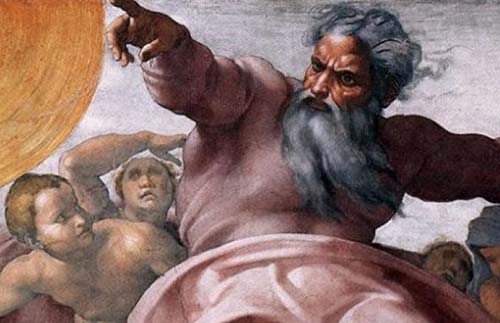
At a recent service I attended, a sermon about the Atonement pointed to the 1995 CofE Doctrine Commission report The Mystery of Salvation. The Doctrine Commission stressed that
The notion of propitiation as the placating by man of an angry God is definitely unchristian.
(page 213)
This actually was a quote from, and hence reinforced, an earlier (1937) Doctrine Commission Report. The 1995 Report continues:
It is significant that modern biblical translations render hilasterion, etc., not as ‘propitiation’, but as ‘sacrifice of atonement’, ‘atoning sacrifice’, ‘expiation’ or ‘means of expiating sin’.
In this they are influenced, as were the Reformers themselves by the fundamental biblical principle that God is primarily the subject of the atoning action.
Those who focus on a model of Christ acting as our substitute need to take care that this does not degenerate into a viewpoint “that Christ’s death was a divinely inflicted punishment which appeased the wrath of God against sinful humanity and enabled God to change God’s attitude towards us, from one of rejection to one of acceptance.”
“Christ does indeed act ‘in our place’ and does for us what we cannot do for ourselves.” But the Report warns about the danger of using substitutionary language in isolation.
Let us stress: we are redeemed not by a theory of redemption, not by a model of redemption, not by mentally affirming the correct theology of redemption; we are redeemed by Christ. We believe in the Redeemer – not in a theory of redemption.
Nonetheless, as we inevitably see the redemption (particularly focused on at this time of the Church Year) through the lenses of models, images, and theories, some (many?) people may need reminding that “The notion of propitiation as the placating by man of an angry God is definitely unchristian.”
The Report also highlights that
the traditional vocabulary of atonement with its central themes of law, wrath, guilt, punishment and acquittal, leave many Christians cold and signally fail to move many people, young and old, who wish to take steps towards faith. These images do not correspond to the spiritual search of many people today and therefore hamper the Church’s mission. In responding, through liturgical revision, to contemporary aspirations of spirituality, we might take our cue from W. H. Vanstone’s reflections on the cross of Christ as revealing the heart of a fellow-suffering God (Love’s Endeavour, Love’s Expense).
(page 133)
New Zealand Anglicanism may point the way. In one of our Eucharistic Prayers, we pray
In your Son you suffered with us and for us,
A New Zealand Prayer Book He Karakia Mihinare o Aotearoa page 437
offering us the healing riches of salvation
and calling us to freedom and holiness.
If you appreciated this post, consider liking the liturgy facebook page, using the RSS feed, and/or signing up for a not-very-often email, …
Instagram’s @liturgy is the new venture – if you are on Instagram, please follow @liturgy.




I wonder whether two unfortunate choices of words have slowed the recognition by evangelical Christians of the truth of the point that is reiterated in your post?
The first, of course, was the choice by the KJV translators to use “propitiation” as the translation for hilasterion, but I see a second unwitting poor choice when the CofE reports of 1937 and 1997 said that the “notion of propitiation as the placating by man of an angry God is … unchristian.” The conclusion is in an absolute sense true, but I think the term “unchristian” seems to label any who have adopted the incorrect definition as “unchristian”, not merely mistaken. Not a necessary implication, I know, but one too easily heard. Instead of “unchristian”, a circumlocution such as “not consistent with the wider revelation in Scripture of the gospel and the character of God” may have got the message across without closing the ears of many who needed to hear it.
I remember the fuss in evangelicalism because the RSV had replaced “propitiation” with “expiation”. The change was not tested on its Biblical merits, but as though it were driven by the rationalistic liberalism of the age. I remember a liberal mid-20th Century Bishop (Spong? J.A.T. Robinson?) being quoted as saying, “Thank God, I don’t need to be saved by the blood of anyone.” That was said several decades after the publication of the RSV, but sentiments like that were already well-known in the liberal wing of the Church. The change to the translation of hilasterion was therefore viewed darkly as the first step in a conspiracy to remove the doctrine of the atonement altogether from Christianity.
That was a great shame. When the theological reason for making the change is understood, and the hilasterion is understood as the place where the Lord has provided his own sacrifice, the gospel is seen as much more gloriously honouring of God than if the hilasterion is understood as a place for placation of God’s wrath.
In case my comments here come to the eyes of someone who still thinks that propitiation is the better translation, I had better add that there is a proper use of “wrath” in relation to the gospel and of the character of God. In Romans 1:16, Paul says that in the gospel, the righteousness of God is revealed (apokaluptetai). Then, in verse 18 he says that the wrath of God is revealed (also apokaluptetai). Given that Paul knew the unchanging nature of God (“I am the Lord, I do not change”), this wrath is not a surging anger against particular acts of sin but the necessary response of One wholly righteous in the face of the aberration brought into the creation by sin. “God is Light, and in him is no darkness at all” and so wrath is his verdict on the darkness of sin. However, “God is Love”, and so it was his own blood that was poured onto the mercy seat to deal in righteousness with the problem. The hilasterion was not a place of placation but the meeting place of light and love, to the glory of God.
I don’t give up hope that this perspective may yet permeate evangelicalism
Trevor
Thanks, Trevor (sorry: your comment moved in mysterious ways for a couple of days in the back rooms of WordPress – don’t ask!). I agree particularly with you about the care we need to take about using “unchristian”. Furthermore, there are Christians who believe bizarre things and do very evil acts – it is too easy for us to attempt to make ourselves look better by brushing them off as not Christian. Holy Week Blessings.
At one point in my life, when I was fully acknowledging that God is, I saw myself with several options. Thanks God, I fell on Saint Anselm’s “Cur Deus homo”, and thereafter embraced the Gospel. Without that book, I would be a muslim today.
Now Saint Anselm does not say the same thing as John Calvin. So the notion of propitiation or expiation had long career before John Calvin was born.